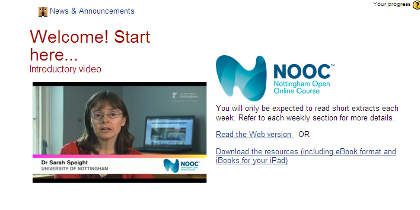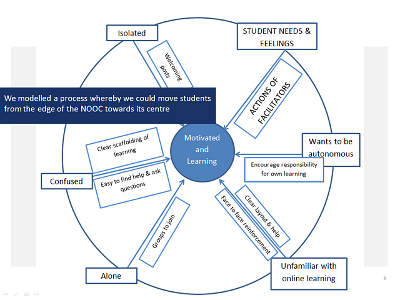
November 25, 2013, by Teaching at Nottingham
The Sustainability ‘NOOC’: learning from a multi-disciplinary online course
Dr Sarah Speight: “In spring 2013, I led a pilot project to foster a sense of community amongst students and staff across our three campuses through learning together. Working with Learning Technologist Helen Whitehead, we constructed the first ‘NOOC’ or Nottingham Open Online Course, called ‘Perspectives on Sustainability’.
“Helen and I came to the project initially with different priorities. I wanted to use the NOOC to encourage cross-campus interaction between students of different disciplines. My aim was to grow interest in, and knowledge of, sustainability and I was determined that the NOOC should appeal to students from all areas (e.g. Humanities as well as Environmental Sciences). Helen was interested in the ‘disruptive’ pedagogies associated with ‘MOOCs’ (Massive Open Online Courses). Helen had experienced MOOCs as a student and wanted to try out other means of creating meaningful and collaborative learning online. We were hoping for 100 students. We got 850 – although only about 200 of these remained active throughout the course.
“Our course design was modelled on Professor Gilly Salmon’s 5-phases of e-learning: access and motivation; online socialisation; information exchange, knowledge construction and development1. These phases were reflected in the activities, assessments and learning outcomes plotted for each of the 10 weeks. For example, our pre-course welcome week, and weeks 1 and 2, encouraged people to introduce themselves, to explain why they were joining in, to blog about their current understanding of sustainability and to contribute to the construction of a visual history. In the middle weeks of the course students carried out waste audits, engaged in discussions, evaluations and SWOT analysis. In the final weeks they prepared poster presentations in which they were asked ‘to present useful knowledge effectively and help to make the reader/viewer think about sustainability and perhaps change something about the way they live’. Our learning outcomes were cumulative; by the end of week 1 students were expected to have ‘Constructed a personal definition of sustainability’; by the end of Week 10, to have ‘Increased your ability to suggest solutions to and discuss sustainability problems by applying the learning acquired from this module to other contexts’.

“We need to publish our NOOC experiences in full but, for now, here are a few insights that may be of use to colleagues developing cross-faculty electives or online courses:
- “Building the tutor team was essential. The week before the NOOC started, Helen ran an online training course for those of us either teaching or facilitating. This bonded us as a team and enabled us to model the learning journey of our students (including establishing our own protocols for facilitation). A similar process could be used for colleagues contributing to multi-disciplinary electives delivered face to face.
- “Analysis of the introductions students posted in the welcome week indicated the significance of the style we adopted as tutors/facilitators. The average length of introductory postings matched those of the first facilitator to post, and also followed the informal tone set. The postgraduate students were less informal than the undergraduates and seemed more concerned to establish their professional and academic identity. They were also more likely to respond to their fellow postgraduates than to undergraduates.
- “Linking the course to the Nottingham Advantage Award incentivised active student participation (particularly from UNNC NUBS undergraduates). We saw the Award as a lower-risk environment for a course that has the potential to move inside the formal curriculum as a cross-faculty elective.
“Our main conclusion is that the NOOC format can help us build community and share learning across campus, context and culture, but only if we pay careful attention to the challenges of online pedagogies.
“Helen and I are now working on the ‘MOOC’ version of our ‘NOOC’, which will be Nottingham’s first offering for ‘Futurelearn’ in January 2014. We are using student feedback, formal evaluation, and data analysis as we adapt the course for a new platform and a global audience.”
Comments from staff who participated in the NOOC:
“[I have] more appreciation of the variety of how [Moodle] can be used. I have been more proactive in accessing and using it as part of module development since starting the course”
“I did gain a lot from reading others’ perspectives. I did learn more about what the University is doing. I did identify some more resources from which to enhance my own work. For example, there was an interesting debate about rubbish cultures which has enhanced my understanding of how localism shapes resources and solutions; I’ve incorporated that into some work I’m doing”
“I liked that you were able to choose which assessments to do and not do”
“I have a new approach of learning things by online classes and I have the chance to share my ideas with other students from other countries”
Dr Sarah Speight
School of Education
[1]Salmon, G. (2002) E-tivities: The key to active online learning. RoutledgeFalmer.
No comments yet, fill out a comment to be the first

Leave a Reply